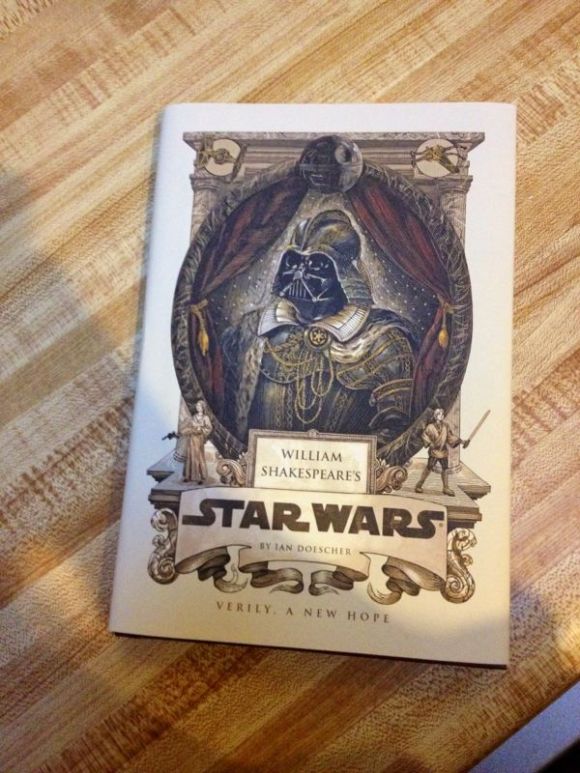Back in high school, I was a Star Wars superfan.
I’ve mentioned before that I grew up in a Star Trek household, but when it came time for the inevitable “Trek vs. Wars” debate, I always took up the Lucasfilm gauntlet. Why? The fantasy and mythology resonated with me in my youth. Return of the Jedi is one of the first films I clearly remember watching in theaters. Also, I could smile and nod, but never completely bought Star Trek’s utopian underpinnings. Star Wars’ Force seemed far more “real” to me.
Oh yeah. And laser swords. Star Wars won the “rule of cool” award hands down even if I didn’t know there was such a rule as a teenager.
I gobbled up every Expanded Universe story I could get my hands on. Tales of the Jedi. Dark Empire. Pretty much every novel from Heir to the Empire to the Black Fleet Crisis. I even bought the RPG sourcebooks even though I didn’t actually play the RPG. I poured over the vehicle schematics; the Alliance and Imperial military hierarchy; the alien races.
After a couple of years, I burned out on it all. It annoyed me when I found contradictory diagrams of the Millennium Falcon’s layout. It bugged the snot out of me when I felt the core characters were out of character. I still love Star Wars, but my passion for the series is more smolder than raging fire.
That’s where I was when I approached Ian Douescher’s William Shakepeare’s Star Wars. It was a gift from my wife. If she weren’t as big a geek as me, we would have problems.

Darth Vader and my shadow
At first glance, it struck me as too much of a gimmick. I never jumped on the Pride and Prejudice and Zombies bandwagon. Then I actually read this lovely book and decided it’s got to be one of the greatest feats of Star Wars fandom ever accomplished.
First off, hardly any action or dialogue is omitted. It’s Star Wars, in iambic pentameter. With authentic Shakesearean archaisms. With terse stage directions and a chorus describing all of the action. Seriously. My favorite stage direction:
Enter PRINCESS LEIA, in beam projected by R2-D2.
And we mustn’t forget asides and soliloquys:
HAN [to Luke]: I say, what a charming girl thou here hast found!
Either I shall destroy her or, perhaps,
I may in time begin to like the wench!
LUKE [aside]: Nay, executioner or lover, both
Are far too great a role for thee to play.
The book provides a few diversions into camp and parody. In a way, not unlike its source. In one groanable passage, Luke Skywalker gazes upon his helmet and laments, “Alas, poor stormtrooper.” There’s also a clever “who shot first” diversion in Mos Eisley. But for the most part, the book plays it straight, to its own benefit. And truthfully (verily?) its shockingly Shakespearean. The transition is remarkably sharp. Han Solo’s one-liners translate into surprisingly eloquent verse, as in here, aboard the Millennium Falcon:
A pilgrim, truly said! For I have gone
From galaxy to galaxy and more,
Yet never hath this faithful worshipper
Found aught to recommend that strange belief–
A singe Force that binds the universe.
True ’tis, no power mystical controls
Han Solo’ yet unfinish’d destiny.
And so I preach the one and only faith:
My simple, merry tricks are all my gods,
And nonsense is the only testament.
I worship at the shrine of my own will.
I haven’t read much Shakespeare since my English major days and this book reminded me of all sorts of stylistic quirks I’d forgotten. Rhyming verse to conclude scenes? Check. The ubiquitous chorus? Check. Expository asides that totally state the obvious? Yes, I’m looking at you Obi-Wan. And furthermore, the book’s iambic pentameter is really solid–using some of Shakespeare’s cheats (abbreviating words and fusing lines of dialogue) to make it work.
And now I’ll write the rest of this review,
In ‘glorious’ iambic pentameter.
Iambic pentam’ter.
Iambic…
See, that shit’s hard.
Beyond mimicking Shakespeare’s style, however, there really is something Shakespearean about this undertaking. Shakespeare wrote in a time when originality was not highly prized. Before becoming plays, his stories existed in legend, lore, or the zeitgeist. He didn’t invent Hamlet. He didn’t invent Romeo and Juliet. But he made them popular. It was okay to be derivative as long as one was entertainining.
Critics of Star Wars could always, fairly, argue its sci-fi setting is inconsequential. It doesn’t do anything with its plot you couldn’t do as a western or fantasy epic. I have a feeling Shakespeare would have shrugged at that criticism (after, you know, puzzling out what “sci-fi” actually is).
Lately, I’ve noticed a flood of Star Wars properties, whether Origami Yoda or Vader’s Little Princess. As a popular culture, we seem to be putting more value than ever in the nostalgic and derivative. That was Shakespeare’s forte. Hell, if Star Wars were around during the reign of Elizabeth he probably would have written his own version of the story.
But then, if you ask me, Goffrey Chaucer’s Star Wars would have been so much cooler. More ironic, more sublime, and more metamodern. Shakespeare’s fine and all. Just a tad overrated.

